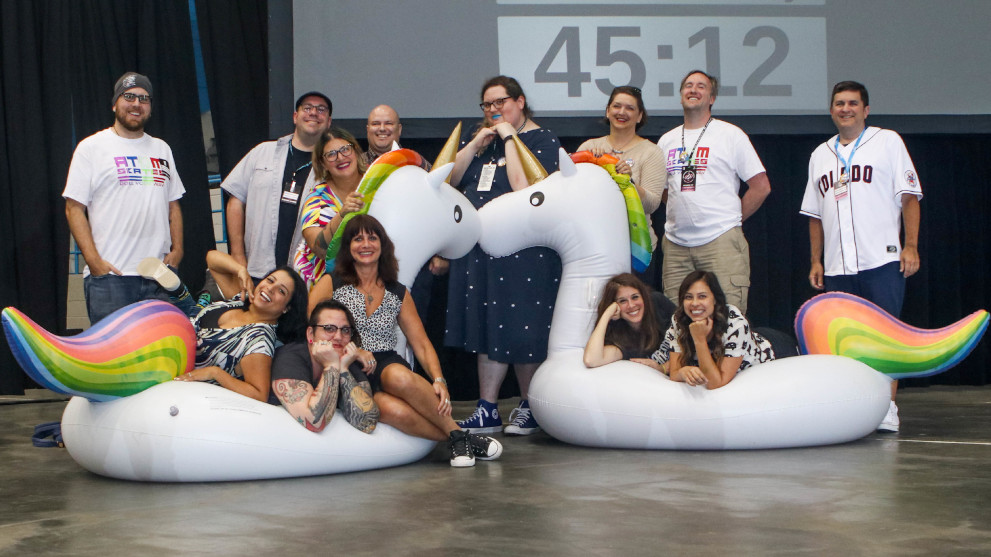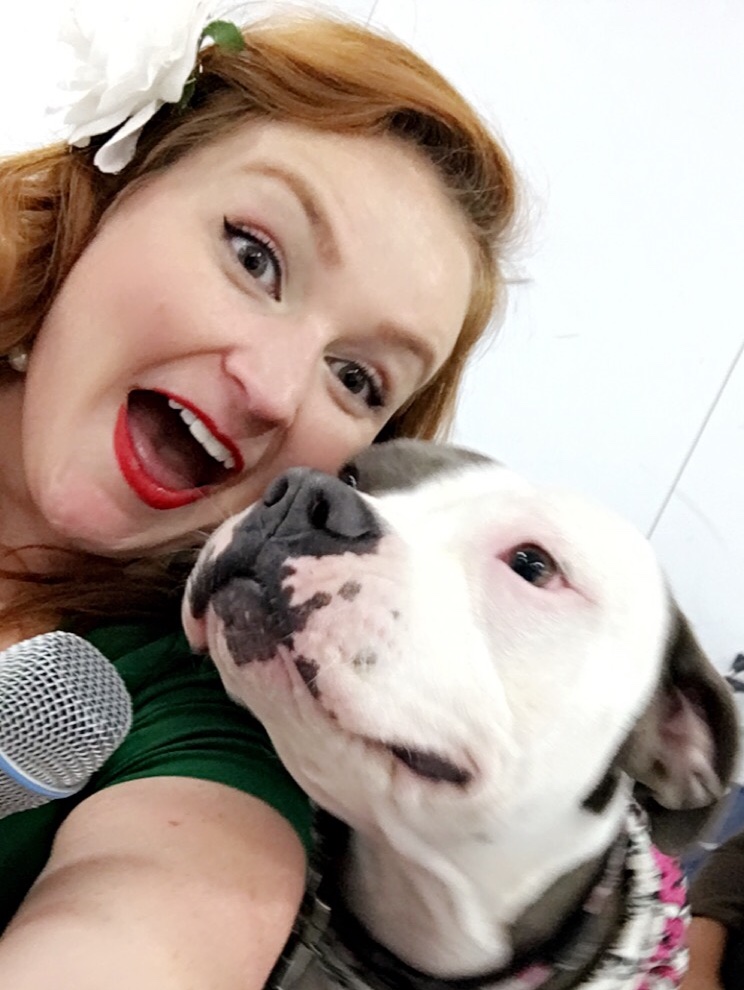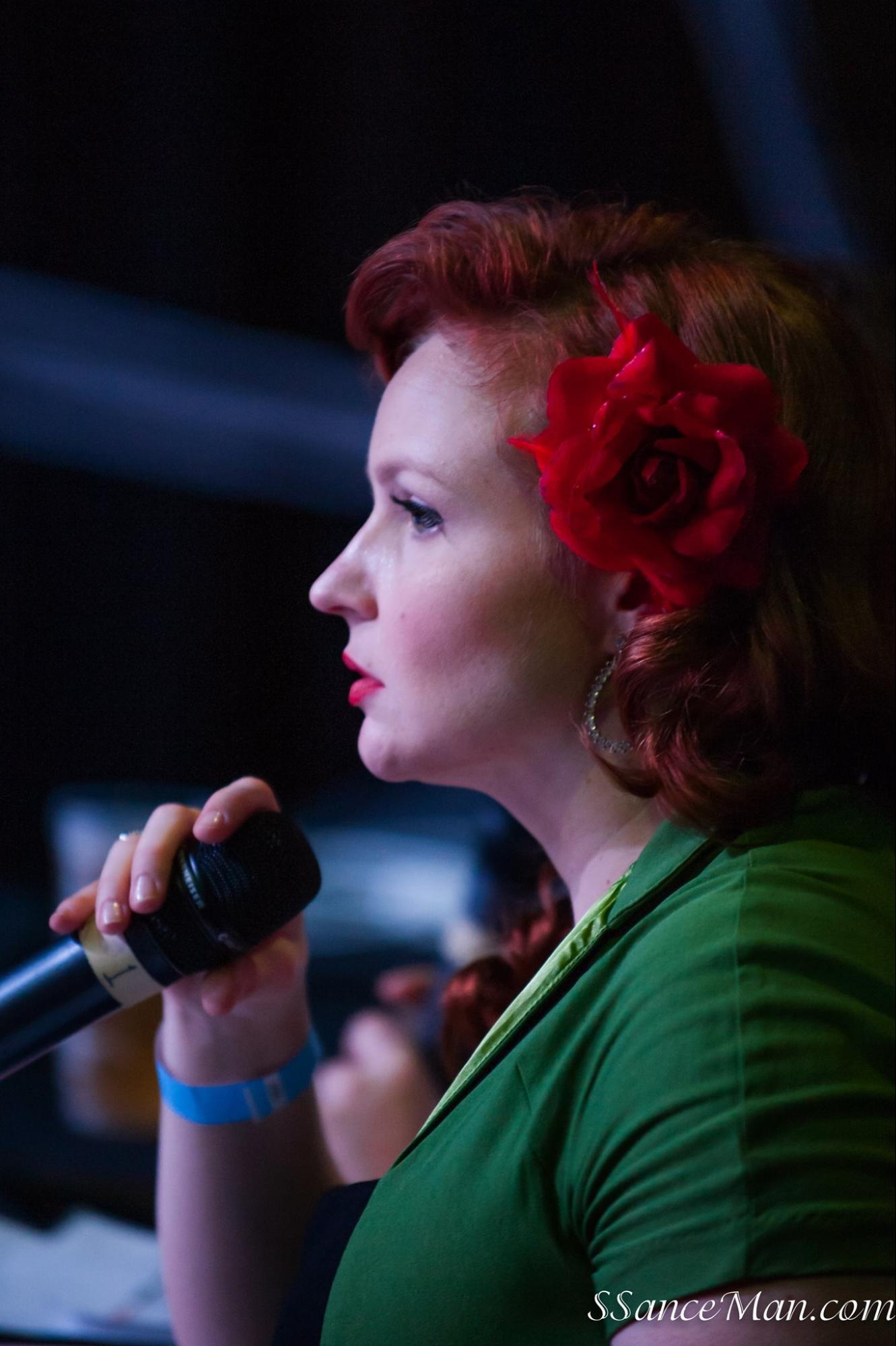
Spotlight on Tournaments: Education Meets our 2019 WFTDA International Playoffs Tournament Head Announcers
by Catherine Beat-Her Bonez
I’m sure everyone is still buzzing over the last two weeks and the amazing gameplay at the 2019 International WFTDA Playoffs. For our fun Tournament focus, I decided to interview the hard working people, who usually interview us: our two playoffs Tournament Head Announcers, Scarlet O’Hurtya and Steffi Skyscraper. I did not expect this talk to blow my mind as much as it did, and I hope you will be blown away as well. Have fun reading and learning. And support your local announcers!
Catherine Beat-Her Bonez: First off: Who are you and what do you do?
Scarlet O’Hurtya: I’m Scarlet O’Hurtya and I’m an announcer with Houston Roller Derby in Houston, Texas. I started skating with Houston Roller Derby in 2007 and started announcing in 2009. I currently had the honor of serving as THA for the 2019 International WFTDA Playoffs in Seattle. In my 12+ years in derby I have served in a variety of capacities behind the scenes (and not-so-behind the scenes), largely on a local or state level but this was my first time dipping my toe into any official “leadership” role with the WFTDA.
Steffi Skyscraper: I’m Steffi Skyscraper, although most folks in derby know me probably know me better by my old derby name of Kim Deal With It (I changed my name at the start of 2019). I’m currently an announcer for the Charlottesville Derby Dames. I was the founding chair of the WFTDA Talent Management Committee (originally the Announcer Pool Coordinator in 2014 and 2015, with the committee formed in 2016), and also helped co-found the Sports Information Committee. I stepped down as TMC chair after 2016, but still serve on the committee.

CBHB: So what do you like about announcing? And, since you are this year’s THA’s, what do you like about Tournament Head announcing?
Steffi: I like announcing because performing has long been in my blood (my favorite class in school was theatrical arts, and I participated in several one-act plays). I always used performance as an escape, to be someone different from who I actually am in real life (which is a socially anxious, painfully shy person). When I announce, I feel like I become a more charismatic, outgoing version of myself, which feels good. As far as being a Tournament Head Announcer goes, I get a great thrill from helping other announcers reach their goals. It’s part of the reason why I got into announcer leadership, because I wanted to help other announcers achieve whatever pinnacles they wish to achieve. I get more of a thrill out of seeing someone achieve their goals than I do out of announcing a big tournament game, to be honest. I’d rather be behind the camera watching someone I’ve helped do great things than be out there myself, so the Tournament Head Announcer role is perfect for someone like me.
Scarlet: I’ve always been a performer and was a competitive speaker in school, so when I was forced to retire from skating much sooner than I planned, I was really excited to seamlessly transition to another role that would still allow me to stay involved and share my excitement for the sport with people. I love getting a reaction from an audience, I love engaging people in a dialogue and being able to enhance someone’s viewing experience. The whole THA thing is new to me, but I have really enjoyed being a part of all the behind-the-scenes work that I have been a benefactor of throughout my 10+ years of announcing. It’s cliché, but I wouldn’t have had the opportunities I’ve had so far without the tutelage and support of some wonderful mentors, so being THA gives me the opportunity to pay that forward and give other announcers a chance to learn, shine, and teach me in a new way.
Don’t know what the differences between in-house and broadcast announcing are?
The Talent Committee just released the different WFTDA announcers job descriptions. Take a look and read all about the various roles announcing has to offer.
- Public Address: PA Announcer, Emcee/Host
- Broadcast: Play-by-Play Announcer, Color Announcer, Producer
- Sideline Interviewer / Social Media Presenter
- Tournament Head Announcer (THA)
CBHB: What are general challenges in announcing and how do you deal with them?
Steffi: In my experience, one of the largest challenges in announcing comes in preparation. Finding footage to watch of teams you’re going to announce can often be difficult, either because footage is restricted via paywall or simply doesn’t exist because the game wasn’t broadcast. Since roller derby doesn’t have box scores like most sports, it’s also difficult to track who top-level players are, as well as their trend lines. In a lot of instances, I go into games blind. I try to counteract this by watching as much of the warmup as I can, and studying what’s available to me prior to the event. WFTDA Playoffs and Championships tournaments tend to be a little bit easier to prepare for since a lot of the tournaments that are broadcast feature leagues within those rankings ranges, but once you get into the range of Continental Cups rankings and under, preparation can be difficult. The revised stats.wftda.com has been a huge help for finding recent scores though! We also sometimes have struggles with confirming pronunciations of names, and at tournaments that can be even more difficult because everyone is stretched so thin that there is often little time to confirm. I’ve had many a coach/player/league rep get mad at me because I only had a couple of minutes during their warmups to confirm name pronunciations, but sometimes it’s the only way I can get the job done.
Scarlet: I think there are different challenges depending on the type of announcing (in-house vs. broadcast vs. WFTDA-level vs. local, etc. etc.). Having some level of preparation/familiarity with the teams you’re calling (including pronunciations, pronouns, number verification, stats, fun facts, analysis, tendencies, etc.) is by far the biggest challenge (as Steffi referenced). Also, knowing your audience and being able to adapt quickly are things that seem to be a challenge across all forms. Responsivity and the ability to think on your feet are key to keeping things moving as an announcer. In-house you have to be careful not to give any critical information away (eg: “the jammer is approaching the pack!”) and walk a fine line between informing and entertaining. On broadcast, you and your partner have to basically keep talking about relevant information nonstop and often multitask (reading information to include while speaking about something else and/or listening to your partner) and that can be tough – there is often a significant learning curve between in-house and broadcast. At the local level you tend to have more casual fans and have to throw in a bit of Derby 101, whereas at the WFTDA or tournament level, you’re usually speaking to a derby-savvy audience, so the content of what you talk about is different and you have to be conscious of any event-specific guidelines while still calling the game to the best of your abilities.

CBHB: Uff, these are quite a lot of challenges. You mentioned some specific struggles which brings me to my next question: If you’ve made a mistake, how do you react and what do you do?
Steffi: I come from a unique standpoint when it comes to mistakes such as misgendering, since I’m a trans woman who has experienced misgendering regularly. As a result, whenever I make a mistake, I do what I would want to have happen whenever someone makes a mistake with me; I correct the record as soon as I’m aware I made the mistake, and I sincerely apologize for what I did. I also try to acknowledge when my white privilege causes me to blindly error, try to correct those mistakes when I make them, and learn from those mistakes so they do not occur in the future. I think we as humans never stop learning, and we should always strive to listen to others who have lived experiences that we have not.
Scarlet: I believe in acknowledging the mistake, apologizing, making the correction, and moving on to do better in the future. Announcers are human and therefore mistakes happen. If you dwell on a mistake too much, it can take you out of the moment and trip you up further. Mistakes are learning opportunities – but you have to genuinely learn from them and through whatever your individual process may be, and do better moving forward. Building your vocabulary to be more inclusive (and eliminating certain words or phrases that are culturally appropriative, ableist, insensitive, racist, sexist, discriminatory, or otherwise hurtful), mastering pronunciations (particularly outside of your language of origin), and adapting speech can be tough, but it’s critical to representing our sport accurately and effectively on a global stage. Doing the work ahead of time to prevent mistakes from happening in the first place is of course the best place to start, but when mistakes happen, I take them very seriously, so I believe it’s important to apologize sincerely and use that as an opportunity to grow. I know I still have a long way to go as there are tons of words and phrases that have been ingrained in my vocabulary (and the cultural lexicon generally) that I’ve seldom given a second thought to, but derby has helped show me how important it is to explore these things at a deeper level, question their origins, and find other ways of expressing the same idea that are not hurtful to others.
CBHB: So, with all these challenges and hurdles, how can the derby community help to improve announcing?
Steffi: Announcing grows at the league level. The derby community can help by involving their announcers within league functions. I’ve seen leagues that don’t allow their announcers to attend practices, and don’t allow announcers to be league members whatsoever. The more your announcers are around your league, the more they can learn about the sport, and the more they can grow as announcers. If your league isn’t playing public games, let your announcers set up microphones during your scrimmages and let them practice alongside you. Encourage them to travel with you to away games and involve them in your travel plans; a good amount of leagues don’t even notify their announcers of their away games anymore. If announcers don’t feel involved in your league, they will not stick around.
You can see this by the number of announcers available at tournaments regressing. We used to have anywhere between 16-18 announcers at tournaments (my first playoff was East Region Playoffs in 2011, where we had 16), but at Winston-Salem we had 11.
Replacing an announcer is very difficult. You can lose a key blocker, and the void may be tough to fill but you can do it. If the announcers lose Tara Armov or Shady Hawkins or Kasey Bomber, though… those are voids we still are feeling as though we haven’t filled.

Scarlet: Provide ACCURATE information in advance! We can only be as good as the information we have available, so the more forthcoming teams are with information, the better prepared announcers can be and the less likely mistakes will happen. Update your team’s information (pronunciations, pronouns, etc.) in the WFTDA Member Portal and ensure NSOs have everything correct on their paperwork because outside of post-season, that’s often all we are handed to work with. Be kind and responsive when an announcer approaches to check your team’s pronouns before a game (and know all your team members’ pronouns) – we simply want to deliver accurate information. Uniforms can make a difference – if you have some variation of your name (abbreviation, nickname, etc.) on your jersey, your name is not readable (eg: covered by long hair, font is hard to read at a distance, no name printed, etc.) and your number somehow gets bunched up or is unreadable, it can make our job much more difficult to identify skaters properly. I’m also a fan of numeric variety – if you have a #9, #90, #990, #99, #09, and #999, chances are, there’s going to be a mixup at some point, particularly if any of those skaters play similar positions or look similar from a distance. I know numbers can be very personal, so I’m not suggesting everyone change their number to ensure nobody else has a similar number, but variety is helpful. Ensure numbers on your jersey are readable and accurate (sometimes jerseys bunch up during game play).
I personally like feedback as I feel it helps me improve, so if I’m doing something wrong (or right!), I want to know about it. For broadcast in particular, viewers can provide CONSTRUCTIVE feedback online (Twitch, twitter, email, etc.). In-house, you can always tell someone in person or pass along feedback through appropriate league reps.
One big thing I think the derby community at-large can do is be more welcoming to announcers. In derby generally, it’s really easy to clique up with your team or stay in your bubble (refs, NSOs, announcers, skaters, etc.), but I think most of us would like to have more conversations with skaters and people outside of our bubbles, but sometimes that’s difficult to initiate. Recognize announcers as an important part of any production rather than an afterthought. Like other volunteers in this sport, announcers put in a lot of time, money, effort, and resources into doing their jobs well. Be inclusive, invite them to things that don’t necessarily involve a microphone. Like most volunteers, the more ties and connections someone has with an entity, the more likely they are to stay, want to improve, and go the extra mile. Everyone wants to belong and it doesn’t take much to make someone feel like they’re part of something bigger.
CBHB: Thank you, Steffi and Scarlet! This was very enlightening and I hope it will get more people into announcing as well as have everyone spread more announcer love.
Are you interested in announcing but don’t know where and how to start?
Here are some personal tips and tricks from Steffi and Scarlet, on what to consider when announcing your first game:
Steffi: I have a couple of rules that I follow. The first is that I allow myself to make five minor mistakes per game. Little slip-ups (like spoonerisms, trips of the tongue, et cetera) happen, there’s no sense in beating yourself up about them, so I always try to give myself that leeway. I also don’t think perfection is an attainable goal and you will only harm yourself trying to achieve perfection (“there is nothing funny or interesting about perfection” says Kristen Bell), so instead I strive to just do my best, whatever my best may look like that day. I do try to be as good-natured as I can about my mistakes, and if I slip up sometimes I’ll point it out myself (one time, I totally mangled a sentence and managed to turn it into a recruiting point by saying “folks, they let me up here to blabber into this microphone and I can barely talk sometimes, so if you want to give it a shot, we’d love to teach you!”). I also have a worst case scenario rule, which for the sake of public release is “don’t curse”. That way, if everything feels like it went wrong, well… did you curse? If you didn’t curse, then hey, one thing went right. If you did curse, then hey, there’s nowhere else to go but up for next time.
In the quest for an all-gender-inclusive greeting, I dropped “welcome ladies and gentlemen” in favor of “hi friends!”. My theory is that if you bought a ticket to our event, you’re my friend for the next few hours (unless you do something that necessitates we kick you out, of course).
As far as announcing one’s first game, the best thing I can suggest is to come in with a good attitude and just try your best. Bring stuff to write with and on (I prefer index cards and pens, but everyone’s different). Make sure to hydrate. Don’t worry if you’re nervous, I’ve announced over 350 games and I still get nervous before every game I announce. The audience, in my experience, is far more willing to listen to someone who wants to have fun and wants to engage them rather than someone who just wants to talk at them.
Scarlet: Study (the rules, the teams, other announcers) – you can never be too prepared. Seek out mentors – I have met very few people in the announcer world who have been less-than-kind to newbies. I agree with Steffi on having gender-inclusive phrases on hand (as a southerner, I’m a fan of “y’all” but also throw in “gang,” “folks,” and some other variations shamelessly ripped off from TV/movies/pop culture) – there have been some great threads on Twitter on this topic. Bring a few pens and a notebook at minimum, but I also find post-it notes handy. Talk to the teams to clarify information.
I second pretty much everything Steffi has already said…be willing to learn from your mistakes, keep an open mind, and have fun with it!
Here at WFTDA Education we’re always on the lookout for interesting topics to learn about, so if you know of any people or leagues who deserve coverage, please reach out to us here.
We’re also looking for copywriters, editors, and proofers of all this content. If you or someone you know would like to volunteer, please email us at marketing@wftda.com.